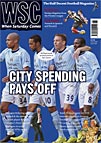 Joel Richards reports on a new initiative to curb fan violence in Argentina that sounds strangely familiar – and comes at a price
Joel Richards reports on a new initiative to curb fan violence in Argentina that sounds strangely familiar – and comes at a price
Going to a match in Buenos Aires is one of the main attractions on offer in the capital city, but the price of watching football is set to increase considerably. The Argentine Football Association (AFA) is looking to implement a £41 million project to register football fans, modernise the game’s infrastructure and eradicate violence from the stands. The Supporters Identification Register (PUAI in its Spanish initials) will oblige an estimated four million football fans to register officially in order to attend matches. Paper tickets will no longer exist, and supporters (including tourists) will have to buy online, at cash points or with prepaid vouchers.
The project is chiefly aimed at controlling who enters stadiums. The implication is that the organised hooligan groups, the barra brava, will be banned from matches. “In itself, the register is totally useless,” said justice minister Aníbal Fernández. “It must be accompanied by a series of other measures.” Since that initial reaction, the government has signed an agreement with the AFA allowing the state to control who is allowed to attend football matches.
“Without further political action,” warns Juan Manuel Lugones, lawyer for FAVIFA (Families of Victims of football-related Violence), “the problem of the barra brava will not be solved. The register is excessive and won’t change anything. Right now the clubs provide tickets and money to the barra brava and then pretend they have no connection.” The concern is that even with a supporters’ register, the links between the barra brava and the clubs will not be broken.
Violence in football is a particularly sensitive subject in Argentina. A very public debate on crime is on the front pages of newspapers while the back pages are filled with reports of violence among the barra brava. One group causing particular concern is Boca Juniors’ La Doce. Hours before Boca’s home game with Argentinos Juniors two months ago, the two factions of La Doce clashed just blocks away from the ground. An elderly woman was shot, and it was a miracle that no other bystanders were hurt as it was a busy Sunday afternoon. More than 170 known hooligans were banned from the recent superclásico between Boca and River Plate, although there were reports that many were seen inside the stadium in the second half. “The barra brava aren’t following the shirt,” says Lugones, “they are after the money.” And he suggests that the financial motivation goes further. “The AFA needs the violence to justify the project. It is a phenomenal piece of business for them.”
The entire cost of the initiative will be passed on to the supporters, with ticket prices expected to rise by around 27 per cent. The average price for a ticket in a standing area is approximately £5, making the price hike relatively minor. Yet in a country where the minimum wage is around £225 per month, it will not be a popular decision.
Tourists, meanwhile, can expect to be stung. Under the new system, which is to be trialled in late May by top flight club Lanús and brought into operation in 2010, foreigners will almost certainly have to pay more. Under the current set-up, tourists can buy the cheaper tickets directly from the clubs, but tourist packages are disproportionately expensive. The official rate charged by Boca to see the superclásico at the Bombonera is £280. At River, to see the same fixture, the figure is closer to £100.
The new project is unlikely to make provision for visitors to register and buy cheaper tickets. “We haven’t been told anything about how this is going to work,” says Lucas Markowiecki of the tourist agency Tangol, which takes groups of tourists to games in Buenos Aires. “And it doesn’t really make much sense. At a club like River Plate, for example, the members already have a card with a photo, their name and details on which they scan to get into the ground.”
To get on the supporters’ register, fans will also have to provide a fingerprint as well as “further details”, according to the organisers. This has raised further concerns, particularly on data protection. The precise details of what fans will have to give is unclear, with a spokesperson for the project simply saying the details will be kept at a headquarters just outside Buenos Aires “that will resist an atomic bomb”. It is not exactly the outside threat that has caused alarm in Argentina. The company involved in the project, Telecom, was embroiled in the wire-tapping scandal in Italy in which hundreds of public figures were spied on.
The register “is a proposal that will allow families to return to the stadiums”, says AFA president Julio Grondona. It should be safer too, with new gates being introduced, and ticket touting should, in theory, be eradicated. In truth, further reaching measures are necessary. “With the right political will,” says Juan Manuel Lugones, “it will still take ten years to solve the problem of the barra brava.” Meanwhile it will be the fans, and the tourists, who foot the bill.
From WSC 268 June 2009